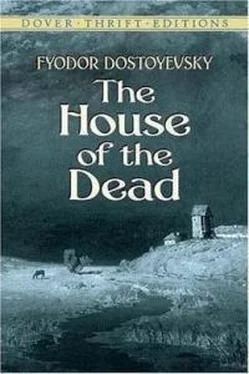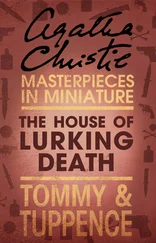We had among us cobblers, bootmakers, tailors, masons, locksmiths, and gilders. A Jew named Esau Boumstein was at the same time a jeweller and a usurer. Every one worked, and thus gained a few pence—for many orders came from the town. Money is a tangible resonant liberty, inestimable for a man entirely deprived of true liberty. If he feels some money in his pocket, he consoles himself a little, even though he cannot spend it—but one can always and everywhere spend money, the more so as forbidden fruit is doubly sweet. One can often buy spirits in the convict prison. Although pipes are severely forbidden, every one smokes. Money and tobacco save the convicts from the scurvy, as work saves them from crime—for without work they would mutually have destroyed one another like spiders shut up in a close bottle. Work and money were all the same forbidden. Often during the night severe examinations were made, during which everything that was not legally authorised was confiscated. However successfully the little hoards had been concealed, they were sometimes discovered. That was one of the reasons why they were not kept very long. They were exchanged as soon as possible for drink, which explains how it happened that spirits penetrated into the convict prison. The delinquent was not only deprived of his hoard, but was also cruelly flogged.
A short time after each examination the convicts procured again the objects which had been confiscated, and everything went on as before. The administration knew it; and although the condition of the convicts was a good deal like that of the inhabitants of Vesuvius, they never murmured at the punishment inflicted for these peccadilloes. Those who had no manual skill did business somehow or other. The modes of buying and selling were original enough. Things changed hands which no one expected a convict would ever have thought of selling or buying, or even of regarding as of any value whatever. The least rag had its value, and might be turned to account. In consequence, however, of the poverty of the convicts, money acquired in their eyes a superior value to that really belonging to it.
Long and painful tasks, sometimes of a very complicated kind, brought back a few kopecks. Several of the prisoners lent by the week, and did good business that way. The prisoner who was ruined and insolvent carried to the usurer the few things belonging to him and pledged them for some halfpence, which were lent to him at a fabulous rate of interest. If he did not redeem them at the fixed time the usurer sold them pitilessly by auction, and without the least delay.
Usury flourished so well in our convict prison that money was lent even on things belonging to the Government: linen, boots, etc.—things that were wanted at every moment. When the lender accepted such pledges the affair took an unexpected turn. The proprietor went, immediately after he had received his money, and told the under officer—chief superintendent of the convict prison—that objects belonging to the State were being concealed, on which everything was taken away from the usurer without even the formality of a report to the superior administration. But never was there any quarrel—and that is very curious indeed—between the usurer and the owner. The first gave up in silence, with a morose air, the things demanded from him, as if he had been waiting for the request. Sometimes, perhaps, he confessed to himself that, in the place of the borrower, he would not have acted differently. Accordingly, if he was insulted after this restitution, it was less from hatred than simply as a matter of conscience.
The convicts robbed one another without shame. Each prisoner had his little box fitted with a padlock, in which he kept the things entrusted to him by the administration. Although these boxes were authorised, that did not prevent them from being broken into. The reader can easily imagine what clever thieves were found among us. A prisoner who was sincerely devoted to me—I say it without boasting—stole my Bible from me, the only book allowed in the convict prison. He told me of it the same day, not from repentance, but because he pitied me when he saw me looking for it everywhere. We had among our companions of the chain several convicts called "innkeepers," who sold spirits, and became comparatively rich by doing so. I shall speak of this further on, for the liquor traffic deserves special study.
A great number of prisoners had been deported for smuggling, which explains how it was that drink was brought secretly into the convict prison, under so severe a surveillance as ours was. In passing it may be remarked that smuggling is an offence apart. Would it be believed that money, the solid profit from the affair, possesses often only secondary importance for the smuggler? It is all the same an authentic fact. He works by vocation. In his style he is a poet. He risks all he possesses, exposes himself to terrible dangers, intrigues, invents, gets out of a scrape, and brings everything to a happy end by a sort of inspiration. This passion is as violent as that of play.
I knew a prisoner of colossal stature who was the mildest, the most peaceable, and most manageable man it was possible to see. We often asked one another how he had been deported. He had such a calm, sociable character, that during the whole time that he passed at the convict prison, he never quarrelled with any one. Born in Western Russia, where he lived on the frontier, he had been sent to hard labour for smuggling. Naturally, then, he could not resist his desire to smuggle spirits into the prison. How many times was he not punished for it, and heaven knows how much he feared the rods. This dangerous trade brought him in but slender profits. It was the speculator who got rich at his expense. Each time he was punished he wept like an old woman, and swore by all that was holy that he would never be caught at such things again. He kept his vow for an entire month, but he ended by yielding once more to his passion. Thanks to these amateurs of smuggling, spirits were always to be had in the convict prison.
Another source of income which, without enriching the prisoners, was constantly and beneficently turned to account, was alms–giving. The upper classes of our Russian society do not know to what an extent merchants, shopkeepers, and our people generally, commiserate the "unfortunate!" [3] Men condemned to hard labour, and exiles generally, are so called by the Russian peasantry.
Alms were always forthcoming, and consisted generally of little white loaves, sometimes of money, but very rarely. Without alms, the existence of the convicts, and above all that of the accused, who are badly fed, would be too painful. These alms are shared equally between all the prisoners. If the gifts are not sufficient, the little loaves are divided into halves, and sometimes into six pieces, so that each convict may have his share. I remember the first alms, a small piece of money, that I received. A short time after my arrival, one morning, as I was coming back from work with a soldier escort, I met a mother and her daughter, a child of ten, as beautiful as an angel. I had already seen them once before.
The mother was the widow of a poor soldier, who, while still young, had been sentenced by a court–martial, and had died in the infirmary of the convict prison while I was there. They wept hot tears when they came to bid him good–bye. On seeing me the little girl blushed, and murmured a few words into her mother's ear, who stopped, and took from a basket a kopeck which she gave to the little girl. The little girl ran after me.
"Here, poor man," she said, "take this in the name of Christ." I took the money which she slipped into my hand. The little girl returned joyfully to her mother. I preserved that kopeck a considerable time.
Читать дальше












